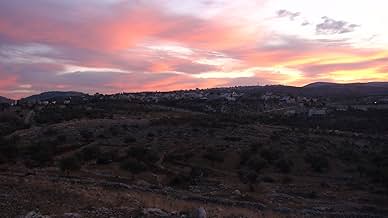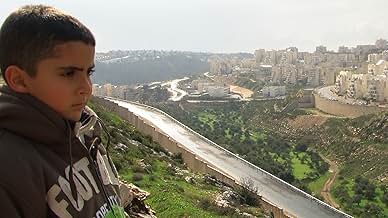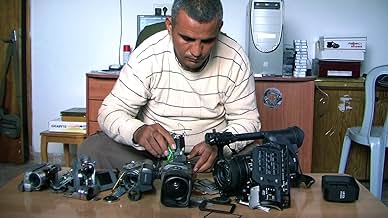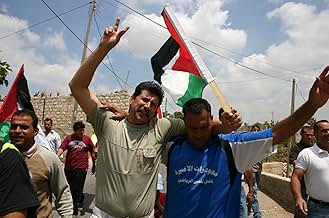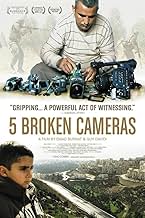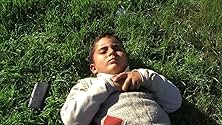IMDb रेटिंग
7.9/10
7 हज़ार
आपकी रेटिंग
अपनी भाषा में प्लॉट जोड़ेंA documentary on a Palestinian farmer's chronicle of his nonviolent resistance to the actions of the Israeli army.A documentary on a Palestinian farmer's chronicle of his nonviolent resistance to the actions of the Israeli army.A documentary on a Palestinian farmer's chronicle of his nonviolent resistance to the actions of the Israeli army.
- 1 ऑस्कर के लिए नामांकित
- 18 जीत और कुल 10 नामांकन
Bassem Abu-Rahma
- Self - Protester
- (as Phil)
Ashraf Abu-Rahma
- Self - Protester
- (as Daba)
फ़ीचर्ड समीक्षाएं
Emad Burnat's documentary about the on-the-ground reality for the people inside the West Bank is a very disturbing portrait of life under military occupation. In fact, when Burnat got detained at the LA airport on his way to the Academy Awards, he noted that it is what the Palestinians go through on a daily basis. Indeed, the settlers and army do some absolutely evil things, such as burning an olive tree.
"5 Broken Cameras" (whose title refers to the different cameras that Burnat had to use after the army kept breaking them) is a documentary that everyone should see. It's a real look at what life is like for the Palestinians under Israeli occupation, a complete contrast to the nonstop depictions of Palestinians as terrorists.
"5 Broken Cameras" (whose title refers to the different cameras that Burnat had to use after the army kept breaking them) is a documentary that everyone should see. It's a real look at what life is like for the Palestinians under Israeli occupation, a complete contrast to the nonstop depictions of Palestinians as terrorists.
Retributive Justice...Oh How Sweet It Is !!
Today, Sunday, February 24, 2013, the Oscars will be hosting this first ever Oscar nominated Palestinian documentary, whose content, we all know full well, will never be shared with the estimated one billion worldwide viewing audience, nor will it ever be permitted to win.
Nevertheless, it just happens to fall on the Jewish Holiday of Purim, which commemorates the deliverance of the Jewish people in ancient Persia, in the wake of a plot by Haman. It is a story recorded in the Biblical Book of Esther. Understandably, this day of deliverance has become a day of Jewish feasting and rejoicing. It is celebrated by the giving of mutual gifts of food and drink, the offering of charity to the poor, the consumption of a celebratory meal, and in addition to the prayers and the grace after the meals, there is often a public recitation of the Scroll of Esther. Other customs include the drinking of wine, the wearing of masks and costumes, as well as the exuberant display of celebrations in public. Like Hanukkah, Purim has more of a 'national' (Israel) than a 'religious' (Judaic) character, and its status as a holiday is on a lesser stature than those days ordained by the Torah. Accordingly, business transactions (including the Oscars), and even manual labor are allowed on Purim.
As early as the 5th century, there was a custom to "BURN AN EFFIGY" of Haman on Purim.
However, the first religious ceremony ordained in the celebration of Purim, is the reading of the Book of Esther (Megillah) in Synagogues. The Megillah is read with a scintillation (a traditional chant) differing from that used in the customary reading of the Torah. When Haman's name is read out during the public chanting of the Megillah in the Synagogues, which by the way occurs 54 times, the congregation engages in boisterous noise-making to "BLOT OUT THE NAME".
Over time, a custom developed of writing the name of Haman on two smooth stones, thereafter knocking them together until the name was blotted out. Others write the name of Haman on the soles of their shoes, and then at the mention of the name, loudly and repeatedly stomp their feet as a sign of contempt. Most though, employ the use a loud and noisy ratchet, called a ra'ashan, or in Yiddish a grager. Although some rabbis have protested against these uproarious excesses (raucous stomping and deafening ratcheting), considering them to be a disturbance of public worship, nevertheless, these two customs in particular, have continued to be universally carried out in almost all Synagogues on Purim.
Just a thought ?!
I wonder if during the Oscars, the Zionists of Hollywood plan to conduct an 'L.A. Festival of Burning', wherein all copies of the "Un-Israeli" film '5 Broken Cameras' will be incinerated, not unlike that conducted by the Nazis in May of 1933, during which upwards of 25,000 volumes of "Un-German" books (predominantly Jewish) were burned ?!
Or worse yet, publicly humiliate themselves during the announcement of the film's nomination for an Oscar award, by stomping their feet and twirling permitted Ra'ashans, in a feeble attempt to 'Blot It Out'?!
After all, just the other day, they did attempt to prevent the film-maker Emad Burnat, together with his wife and 8 year old son, from attending, by way of harassment and intimidation at the hands of Immigration Officials at L.A.X.
Perhaps, it was because a 'Film' or even a 'Broken Camera' in the hands of a Palestinian now constitutes a potential 'Terrorist Threat' ?!
Today, Sunday, February 24, 2013, the Oscars will be hosting this first ever Oscar nominated Palestinian documentary, whose content, we all know full well, will never be shared with the estimated one billion worldwide viewing audience, nor will it ever be permitted to win.
Nevertheless, it just happens to fall on the Jewish Holiday of Purim, which commemorates the deliverance of the Jewish people in ancient Persia, in the wake of a plot by Haman. It is a story recorded in the Biblical Book of Esther. Understandably, this day of deliverance has become a day of Jewish feasting and rejoicing. It is celebrated by the giving of mutual gifts of food and drink, the offering of charity to the poor, the consumption of a celebratory meal, and in addition to the prayers and the grace after the meals, there is often a public recitation of the Scroll of Esther. Other customs include the drinking of wine, the wearing of masks and costumes, as well as the exuberant display of celebrations in public. Like Hanukkah, Purim has more of a 'national' (Israel) than a 'religious' (Judaic) character, and its status as a holiday is on a lesser stature than those days ordained by the Torah. Accordingly, business transactions (including the Oscars), and even manual labor are allowed on Purim.
As early as the 5th century, there was a custom to "BURN AN EFFIGY" of Haman on Purim.
However, the first religious ceremony ordained in the celebration of Purim, is the reading of the Book of Esther (Megillah) in Synagogues. The Megillah is read with a scintillation (a traditional chant) differing from that used in the customary reading of the Torah. When Haman's name is read out during the public chanting of the Megillah in the Synagogues, which by the way occurs 54 times, the congregation engages in boisterous noise-making to "BLOT OUT THE NAME".
Over time, a custom developed of writing the name of Haman on two smooth stones, thereafter knocking them together until the name was blotted out. Others write the name of Haman on the soles of their shoes, and then at the mention of the name, loudly and repeatedly stomp their feet as a sign of contempt. Most though, employ the use a loud and noisy ratchet, called a ra'ashan, or in Yiddish a grager. Although some rabbis have protested against these uproarious excesses (raucous stomping and deafening ratcheting), considering them to be a disturbance of public worship, nevertheless, these two customs in particular, have continued to be universally carried out in almost all Synagogues on Purim.
Just a thought ?!
I wonder if during the Oscars, the Zionists of Hollywood plan to conduct an 'L.A. Festival of Burning', wherein all copies of the "Un-Israeli" film '5 Broken Cameras' will be incinerated, not unlike that conducted by the Nazis in May of 1933, during which upwards of 25,000 volumes of "Un-German" books (predominantly Jewish) were burned ?!
Or worse yet, publicly humiliate themselves during the announcement of the film's nomination for an Oscar award, by stomping their feet and twirling permitted Ra'ashans, in a feeble attempt to 'Blot It Out'?!
After all, just the other day, they did attempt to prevent the film-maker Emad Burnat, together with his wife and 8 year old son, from attending, by way of harassment and intimidation at the hands of Immigration Officials at L.A.X.
Perhaps, it was because a 'Film' or even a 'Broken Camera' in the hands of a Palestinian now constitutes a potential 'Terrorist Threat' ?!
This document received so many Awards From Sundance festival to others, Can someone explain me why the hell every other movie on IMDb has Award section popping out immediately on a website but this movie NOT????
"5 Broken Cameras won the World Cinema Directing Award at the 2012 Sundance Film Festival. it won the 2013 International Emmy Award.The film also received the Special Broadcaster IDFA Audience Award and the Special Jury Award at the International Documentary Film Festival Amsterdam in 2011. In addition, the film won the Golden Apricot at the 2012 Yerevan International Film Festival, for Best Documentary Film, the Van Leer Group Foundation Award for Best Israeli Documentary at the Jerusalem Film Festival in 2012, and the Busan Cinephile Award at the 17th Busan International Film Festival in 2012. 5 Broken Cameras was nominated for Best Documentary Feature at the 85th Academy Awards Nominated for Best Documentary Feature in the 85th Academy Awards, and for the Asia Pacific Screen Award for Best Documentary of 2012...
"5 Broken Cameras won the World Cinema Directing Award at the 2012 Sundance Film Festival. it won the 2013 International Emmy Award.The film also received the Special Broadcaster IDFA Audience Award and the Special Jury Award at the International Documentary Film Festival Amsterdam in 2011. In addition, the film won the Golden Apricot at the 2012 Yerevan International Film Festival, for Best Documentary Film, the Van Leer Group Foundation Award for Best Israeli Documentary at the Jerusalem Film Festival in 2012, and the Busan Cinephile Award at the 17th Busan International Film Festival in 2012. 5 Broken Cameras was nominated for Best Documentary Feature at the 85th Academy Awards Nominated for Best Documentary Feature in the 85th Academy Awards, and for the Asia Pacific Screen Award for Best Documentary of 2012...
5 Broken Cameras (2011) is a Palestinian documentary film directed by Emad Burnat and Guy Davidi. The movie is narrated by Emad Burnat, who films life and strife in his village in the occupied West Bank.
Living in an occupied territory will always be frustrating and, at times, humiliating. However, the major issue that the film follows is the building of huge Israeli "settlements" in the occupied territory. (The "settlements" look like large, fortress-like, apartment complexes.)
Although we have all seen footage of Palestinians throwing rocks, and Israeli soldiers responding with teargas and rubber bullets, Burnat films less dramatic instances of nonviolent resistance by Palestinian villagers. As a participant-observer, Burnat is himself vulnerable. He was seriously injured in one skirmish. The title "Five Broken Cameras" refers to Burnat's own cameras, which were smashed during confrontations with Israeli soldiers. (Some of the cameras were purposely destroyed, while others were hit by rubber bullets.)
Whatever your position is about the Israeli-Palestinian conflict, it's useful to see a film that presents the Palestinian perspective. We saw this movie at Rochester's Little Theatre as part of the excellent Witness Palestine Film Series. It will work better on a large screen, but it's worth seeing on DVD if that's the only option available. Five Broken Cameras was nominated for an Oscar in 2012 as Best Foreign Film.
Living in an occupied territory will always be frustrating and, at times, humiliating. However, the major issue that the film follows is the building of huge Israeli "settlements" in the occupied territory. (The "settlements" look like large, fortress-like, apartment complexes.)
Although we have all seen footage of Palestinians throwing rocks, and Israeli soldiers responding with teargas and rubber bullets, Burnat films less dramatic instances of nonviolent resistance by Palestinian villagers. As a participant-observer, Burnat is himself vulnerable. He was seriously injured in one skirmish. The title "Five Broken Cameras" refers to Burnat's own cameras, which were smashed during confrontations with Israeli soldiers. (Some of the cameras were purposely destroyed, while others were hit by rubber bullets.)
Whatever your position is about the Israeli-Palestinian conflict, it's useful to see a film that presents the Palestinian perspective. We saw this movie at Rochester's Little Theatre as part of the excellent Witness Palestine Film Series. It will work better on a large screen, but it's worth seeing on DVD if that's the only option available. Five Broken Cameras was nominated for an Oscar in 2012 as Best Foreign Film.
It is rare to have something like this penetrate through the generally Zionist controlled media in the West. I am sure Zionists will try to label this film as "biased" and "one-sided," as usual in their intended distortion or paranoia. They might even start a campaign to lower its rating, as they normally do! But the facts and the images speak for themselves. Why is the world allowing the Israelis to get away with more land grabs and more injustice? The only reservation is that it does not explore fully the tragedy of what has been done to the Palestinians by Zionist colonization. This is not a special case. It is also similar to what happened in 1948 when almost 80% of Palestine was taken over, and the population in many cities and villages expelled and made into refugees. Hundreds of villages were ethnically cleansed, and several of them today have Israeli Jews living in the old houses owned by Palestinians (not having paid for them of course). It is almost like highway robbery. One film cannot do everything of course, but maybe it will encourages some people to dig more for the truth.
क्या आपको पता है
- ट्रिवियाEmad Burnat is the first Palestinian nominated for the Academy Award for Best Documentary Feature.
- भाव
Emad Burnat - Narrator: Healing is a challenge in life. It's a victim sole obligation. By healing, you resist oppression. But when I'm hurt over and over again, I forget the wounds that rule my life. Forgotten wounds can't be healed. So I film to heal. I know they may knock at my door at any moment. But I'll just keep filming. It helps me confront life. And survive.
- कनेक्शनEdited into P.O.V.: 5 Broken Cameras (2013)
- साउंडट्रैकMusic from the albums: Randana, Majâz, As far
Music composed and performed by Samir Joubran, Wissam Joubran, Adnan Joubran
Interpreted by Le Trio Joubran
Percussions by Yousef Hbeisch
(p) & (c) Randana - 2007
Courtesy of Randana
टॉप पसंद
रेटिंग देने के लिए साइन-इन करें और वैयक्तिकृत सुझावों के लिए वॉचलिस्ट करें
- How long is 5 Broken Cameras?Alexa द्वारा संचालित
विवरण
- रिलीज़ की तारीख़
- कंट्री ऑफ़ ओरिजिन
- आधिकारिक साइटें
- भाषाएं
- इस रूप में भी जाना जाता है
- 5 Broken Cameras
- फ़िल्माने की जगहें
- उत्पादन कंपनियां
- IMDbPro पर और कंपनी क्रेडिट देखें
बॉक्स ऑफ़िस
- US और कनाडा में सकल
- $1,09,983
- US और कनाडा में पहले सप्ताह में कुल कमाई
- $6,674
- 3 जून 2012
- दुनिया भर में सकल
- $1,46,475
- चलने की अवधि1 घंटा 34 मिनट
- रंग
- ध्वनि मिश्रण
- पक्ष अनुपात
- 1.78 : 1
इस पेज में योगदान दें
किसी बदलाव का सुझाव दें या अनुपलब्ध कॉन्टेंट जोड़ें


